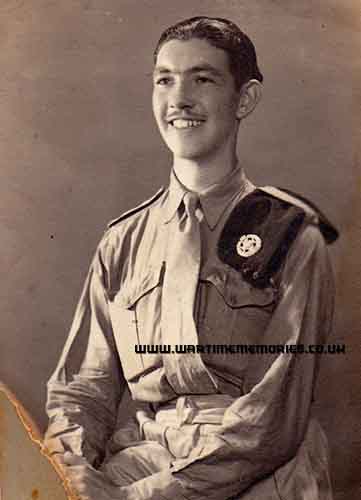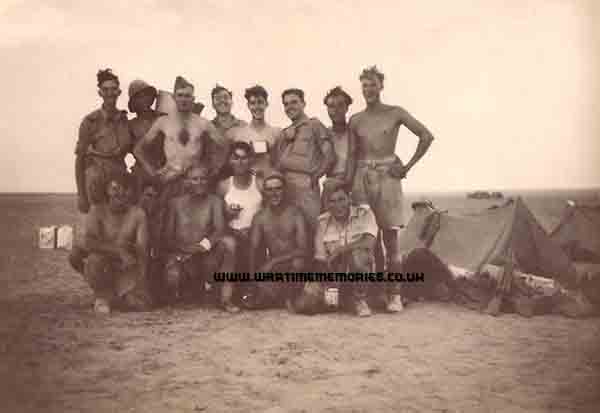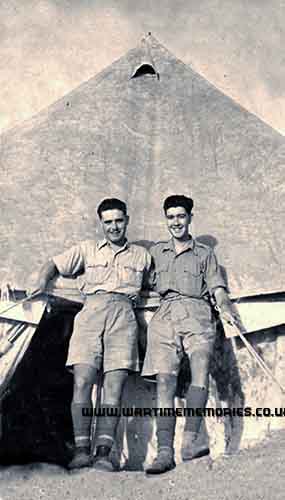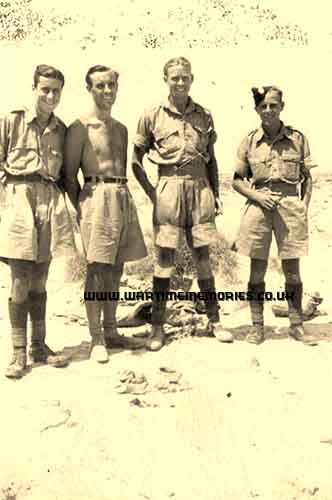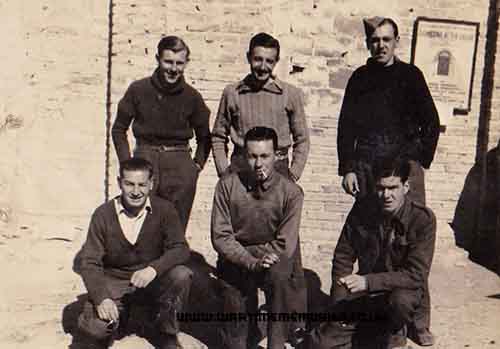Rifleman. Frederick Charles Pinner
British Army Rifle Brigade
from:23 Cymon Street, Bethnal Green, London
Fred Pinner joined the Tower Hamlet Riffles in 1938 and was called up in early September 1939. He was trained as a Signaller. This is his story:
In September 1939, I was moved from London to Lincolnshire to become part of Motorized Infantry, January 1940. I was then moved down to Wellingborough to be billeted out with a local family and carried out training schemes around Cambridgeshire. I trained as a signaller. (Signaller’s are employed as radio/ telephone operators, relaying messages for field commanders at front line Army units) Then back to Wellingborough to prepare for embarkation in Liverpool to Egypt in early November, arriving in Port Said on New Year’s Day, 1941.
When our vehicles arrived we became 9BN Rifle Brigade and joined 22nd Guards Brigade in the first sweep up to Agedabia to relieve 2RB in the first attack by Rommel and withdrawal back to Egypt. Part of our company were cut off at Dernia but managed to break out and get to Tobruk before it was surrounded, those of us in 9BN were later taken dock side and boarded the ’Water Hen’ an Australian destroyer to Alexandria and then by road back to Beni Yusef camp in Cairo where the battalion was then encamped.
Later in October/November we took part in the 2nd sweep up the desert to relieve Tobruk and then on to Benghazi area to take up positions and prepare for further advance. Once again we came under attack and set up a defence line we called 'Knightsbridge', but came under bomb attack and had to make a quick withdrawal. It was during this move that our wireless car broke down at night and three of us were left stranded. The following morning as we were making tea we saw a British truck approach us and we thought we were alright. But it was a truck taken by a German Patrol. Captured we were taken POW’s eventually arriving at PG65 in the Bari area of Italy July 1942.
We occupied our time with reading paperbacks sent from back home, there were never enough to go round, so we swapped books with other lads. We played chess and bridge with sets sent out by the Red Cross, As well as food parcels, which were shared by four men, we were generally sent practical items that we could use straight away, things like musical instruments or games. We also received food parcels from Canada, which were generous. This led to bartering things that we were not going to need with the Italian Guards. Tins of coffee could be exchanged for several loaves of bread as coffee was in great demand by the Italians, even though they were as hungry as we were. When our troops invaded Sicily during July/August 1943 our camp was cleared and we moved to a few different camps along the way ending up at camp around Northern Italy, (Campo F.57) which was taken over by German Guards when Italy surrendered.
At this time Prisoners of War came from many different camps in Italy. This led to a lot of confusion; the German Guards were not aware which camp we came from and as our compounds were only divided by low wire fences we were able to look about us and see if we recognised anyone we knew from other camps. I was able to spot my boyhood friend and fellow ‘Tower Hamlets Rifles‘, Bill Dean. I made a quick jump over the fence and joined his lot and we stayed together for the rest of the war.
In my case it was to a place called Freiberg (Saxony) to work in a forced labour camp, lead mine, until the end of the war. On arrival we were asked our jobs before the war. Bill Dean was a carpenter and although I was an apprentice compositor, I thought that I could manage a bit of woodwork, so I said carpenter as well. Our German Guards could not speak much English and we could not speak much German so we were asked if we had anyone amongst us who could speak German. We did not, however, we did have a couple of Jewish lads and they spoke Yiddish, It was suggested that as the root of the language was similar that they would be able to understand one another. One Jewish lad then became the interpreter (Übersetzer) and another organised work parties. This meant that the only two lads who never worked in the lead mine were Jewish. Everyone was given the same work clothes so it was impossible to distinguish what nationality anyone was until we tried to converse. Bill Dean and I were set to a workshop making ladders. The following diary written at the time tells part of what happened between then and my landing back home in England.
Fred Pinner’s War Diary, April to May 1945
Saturday 14th April 1945 Move from Freiberg by train to Dresden. Spent the night in open coal truck in Dresden.
Sunday, 15th April Move from Dresden by train to Pirna, spent the night in same trucks in sidings - no food all day.
Monday 16th April Move from Pirna to Konigstein - 15 kilometres march, had rations in the evening. 400grms of bread and meat. Halt near Konigstein Castle.
Tuesday 17th April Remain in camp for the day, rations today 400grms of bread, meat, coffee and sugar.
Wednesday 18th April Still in camp, will possibly stay here for a while. Rations short owing to theft, today we get 333grms of bread, two days issue of meat coffee and sugar.
Thursday 19th April Still in camp, last day of rations from Pirna, rations today 333grms of bread, coffee and sugar.
Harold, Bill and me take a walk to nearby village in search of food, with exception of a few remarks over the allied bombing, we were treated well by civilians that we conversed with and procured potatoes, eggs and bread. Also a smoke. Pirna bombed today.
Friday 20th April Still in camp today, Jack, Don and Jack go out for food with good results, they were also well met by the Germans.
Saturday 20th April Move from Konigstein to Hellersdorf, are split up on arrival over various farms. After a few days, I find work building a summer house about 5 kilometers away and cannot find time to keep a daily log. Our camp rations have been cut down due to the fact that we are no longer on the march but many of us, in fact most of us, have ventured out of camp and secured other food.
By bartering clothes, (in some cases had given to us), I had done alright for food through working, for which our sole wages are food and cigarettes at the end of the work. I was given 200 cigarettes for working in addition to the few we have been given every day. Sunday finishes the week with rumors of a separate peace or rather capitulation of Germany to British and American forces.
Monday 30th April There are further rumors today of Germany’s capitulation and although we cannot get confirmation, the attitude of the civilians seems to support it. There is also talk of a repatriation scheme to get us away in the next few days. Tuesdays ‘griff’ says that we will move on Thursday.
Felt rather queer in the evening and could not go to work for Wednesday. Bill deputised for me at work today. We heard that ‘Hitler’ and ‘Mussolini’ are dead and that another Government has taken over Germany. This news is confirmed later on in the day.
Thursday, Bill again went to work in my place, no news today of moving. No further developments on Friday. Saturday went to work myself. Very heavy artillery fire near here.
Sunday finds us with better weather. We have managed to get food and cigarettes all week.
Monday 7th May Were told immediately we arrived at work that the Russians were very near and expected here by Wednesday. Artillery fire is very close. We learn on arrival at the camp that we move tomorrow.
Tuesday 8th May Moved off this morning at 7oclock to Teplitz among columns of German soldiers, on the way to hand ourselves over to Anglo-American Forces. This proves to be the most hectic nerve racking day I have experienced since being POW. Until sunset the area and road through which we were marching was continually bombed and strafed causing us to lose several comrades. The Russians planes could hardly be blamed for this owing to lack of orders in the marching columns which made it impossible to distinguish from the air. When we were within five kilometres from Teplitz, the Russian spearhead had already come in from the West and the North and occupied the town. There is no sign of the rest of the F.57 lads and we decide to take shelter in a farmhouse and later go through to Teplitz. On the road we meet a German soldier who thinks he can take us through to American lines and after walking a few kilometres to Bilin, we are offered a lift on a truck but the road is now packed with vehicles, civilians and Germans trying to get through to American lines and after consideration we decide to stay the night and meet the Russians next morning. We managed to find a sheltered spot and lay-us-down for the night.
Wednesday 9th May We awake at dawn and after a little reconnaissance we find two cars loaded with food, tobacco, cigars, cigarettes and all odds and ends that had been dumped the night previous by SS troops. After this we decide to stay a while, have a good feed and move off to Chemintz in the car we have succeeded to get going. We move off about 5 o'clock in the evening passing the Russian columns entering Teplitz but find that the road which is the only pass through the mountain range has been blown up and owing to Russian transport coming through continually, allows only through traffic to Teplitz. We decide to return to our rendezvous and try again first light tomorrow. On our return we go to a house to have some coffee, cooked for supper and hear the news that the Capitulation terms have been concluded between the German and Allied Forces and something of the celebrations going on back home.
Thursday 10th May Awake at first light and quick meal, are on our way again but find that the road is still blocked so decide to make our way South to Karlsbad where the Americans are supposed to be. Passing endless columns of POW civilians and German soldiers going through to Karlsbad. We arrive at Komotau to have our car taken from us by the Russians, who are commandeering all means of transport. We find billets in a library adjoining a flat that has been vacated where we are able to do our cooking. At present we have more food than we can eat and out of the seven of us, four have stomach troubles. Our policy is to stay here a few days and watch for a further development that will take us on our way home.
Friday 11th May We are given notice to quit our flat today but have already secured other billets with some German women who are cooking and looking after us. Our only task now is to secure food for all of us which although yet is not difficult, will probably be in a few days’ time owing to lack of organisation. Food is where you find it!
Saturday 12 May End
August 4th 2014 Today is the anniversary of the ‘First World War’ and I am sat with my daughter I have discovered that she has rescued this Diary from the oblivion of the loft during a recent move and I am allowed to finish the above Diary, from Saturday 12th May to the safe arrival back home to Bethnal Green.
So now Back to Saturday 12th May 1945 During our search for food the seven of us came across a First Aid Post that was set up by a Scot. He had two lads that he had being caring for and then explained to us that a coach would be coming later that day to get them to a Repatriation Centre and suggested that we also wait there and join them for the first stop back home. By the evening we had arrived to join lads from all around camps in Germany. We spent the night there and by midday about 50 or so various types of vehicles had been found and the whole column went on its way to where the nearest American Forces were based. After being provided with clean clothes and an introduction to American cooking we were taken to an airfield where about 30 ‘Dakotas’ were lined up ready to take us in groups of 20 to land in Belgium, Those of us who were English were taken to Hotels to stay overnight and in the morning to another airfield locally. Then in small groups of a dozen or so boarded ‘Lancaster’ aircraft that were returning to England from their duties in Europe and landed us safely back home to the welcome ‘Green Fields’ of England.
